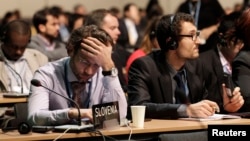Negotiators from 190 countries at the U.N. climate talks in Warsaw, Poland, have made little progress towards forging a new treaty to curb global warming. Core issues continue to divide the world community as the meeting wraps up.
Negotiators in Warsaw were not able to lay the groundwork for a new treaty, says Annie Petsonk, international counsel and treaty expert for the Environmental Defense Fund.
“The meeting didn’t fall apart. That’s good," she said. "But in terms of accomplishments, we did not expect major breakthroughs at this meeting. We expected it to be a fairly ‘get down to work’ meeting.”
Despite two weeks of talks, Petsonk says the delegates made no headway on setting targets to cut dirty fossil fuel emissions from power plants, cars and buildings linked to global warming.
“A second issue is what financing are the wealthier countries going to put forward to help the poorer countries to both reduce emissions and help adapt to a changing climate? And on those twin issues [emissions cuts and financing] there was not significant progress at this meeting, and that’s a source of big frustration,” she said.
Poorer countries were especially frustrated that there was little sign in Warsaw that developed nations would deliver on a promise to help them with $100 billion annually by 2020.
On the emissions front, China has surpassed the United States as the world’s largest polluter. Yet in the context of the negotiations, it is still considered a developing nation and not required to make the same cuts as industrialized countries. Petsonk is hopeful that China, which never ratified the Kyoto Climate Change Protocol, will play a greater role in any new agreement.
“China has a dual motivation for wanting to engage in the global effort, and that’s not only because of the climate change impacts, but also many of the things that produce greenhouse gas emissions are contributing to horrendous air pollution problems in major Chinese cities,” she said.
Anger over the lack of meaningful progress in Warsaw led some 800 environmental and development activists - including major groups like Greenpeace and the World Wildlife Fund - to walk out of the talks. Petsonk says despite the walkout, an even larger segment of the community stayed, among them the Environmental Defense Fund, the advocacy and research group she represents.
“We’re committed to trying to get the maximum we can out of the [United Nations] Framework Convention on Climate Change [UNFCCC] and we also recognize that the UNFCCC is not the only game in town," she said. "There are a number of other forums where governments are trying to tackle the climate problem. So the multilateral forum of all 190 countries plus in the world that are meeting in Warsaw is one setting, but there are smaller groupings of countries getting together to try to boost action in other areas.”
One hopeful sign in Warsaw was agreement to reduce emissions from deforestation and degradation. Petsonk says nations must move forward to craft a plan that can measure countries' commitments to avert climate catastrophe.
Negotiators in Warsaw were not able to lay the groundwork for a new treaty, says Annie Petsonk, international counsel and treaty expert for the Environmental Defense Fund.
“The meeting didn’t fall apart. That’s good," she said. "But in terms of accomplishments, we did not expect major breakthroughs at this meeting. We expected it to be a fairly ‘get down to work’ meeting.”
Despite two weeks of talks, Petsonk says the delegates made no headway on setting targets to cut dirty fossil fuel emissions from power plants, cars and buildings linked to global warming.
“A second issue is what financing are the wealthier countries going to put forward to help the poorer countries to both reduce emissions and help adapt to a changing climate? And on those twin issues [emissions cuts and financing] there was not significant progress at this meeting, and that’s a source of big frustration,” she said.
Poorer countries were especially frustrated that there was little sign in Warsaw that developed nations would deliver on a promise to help them with $100 billion annually by 2020.
On the emissions front, China has surpassed the United States as the world’s largest polluter. Yet in the context of the negotiations, it is still considered a developing nation and not required to make the same cuts as industrialized countries. Petsonk is hopeful that China, which never ratified the Kyoto Climate Change Protocol, will play a greater role in any new agreement.
“China has a dual motivation for wanting to engage in the global effort, and that’s not only because of the climate change impacts, but also many of the things that produce greenhouse gas emissions are contributing to horrendous air pollution problems in major Chinese cities,” she said.
Anger over the lack of meaningful progress in Warsaw led some 800 environmental and development activists - including major groups like Greenpeace and the World Wildlife Fund - to walk out of the talks. Petsonk says despite the walkout, an even larger segment of the community stayed, among them the Environmental Defense Fund, the advocacy and research group she represents.
“We’re committed to trying to get the maximum we can out of the [United Nations] Framework Convention on Climate Change [UNFCCC] and we also recognize that the UNFCCC is not the only game in town," she said. "There are a number of other forums where governments are trying to tackle the climate problem. So the multilateral forum of all 190 countries plus in the world that are meeting in Warsaw is one setting, but there are smaller groupings of countries getting together to try to boost action in other areas.”
One hopeful sign in Warsaw was agreement to reduce emissions from deforestation and degradation. Petsonk says nations must move forward to craft a plan that can measure countries' commitments to avert climate catastrophe.




